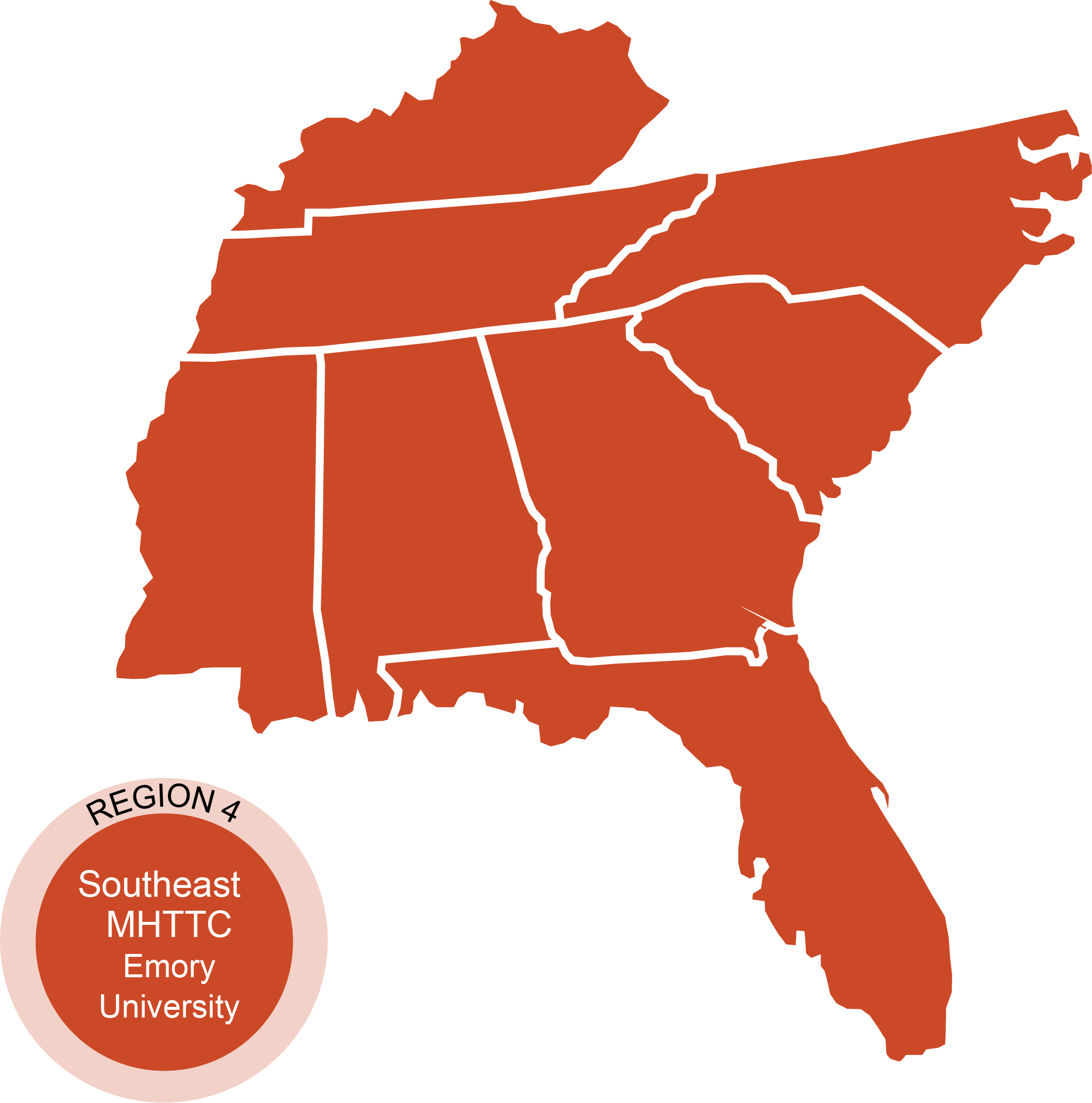Home > MIC Stories: Southeast Certified Community Behavioral Health Clinic (CCBHC) Learning Community

MIC Stories (MHTTCs Implementing Change) feature technical assistance projects that had a significant impact on practice.
Based on funding opportunities from SAMHSA and on-going discussions with regional stakeholders, the Southeast MHTTC implemented a regional learning community to help states and provider organizations enhance their understanding and identify their unique considerations for implementation of the Certified Community Behavioral Health Clinic (CCBHC) model.
The Southeast MHTTC, in collaboration with the National Council for Mental Wellbeing CCBHC Success Center, implemented a Southeast CCBHC Learning Community to engage regional mental health state leaders and provider organizations in advancing this innovative approach to providing access to integrated and comprehensive mental health and addiction care.
This Learning Community focused on orienting participants to the CCBHC model, highlighting the impact of the program to date, and identifying considerations for implementation and sustainability of the model. The Southeast CCBHC Learning Community consisted of six virtual learning sessions and six virtual technical assistance/coaching sessions, occurring each week for a total of 12 weeks between September 23 and December 16, 2021.
The Southeast CCBHC Learning Community supported teams working towards the common mission of improving access to integrated, evidence-based behavioral health care by:
The Southeast CCBHC Learning Community consisted of six virtual learning sessions and six virtual technical assistance/coaching sessions, occurring each week for a total of 12 weeks between September 23 and December 16, 2021.
Thirteen teams, which included 3 state authorities and 10 provider organizations, participated in the Southeast CCBHC Learning Community. Each team was comprised of 1 – 3 participants. Roles of participants varied across teams and included Chief Executive Officers, Chief Financial Officers, Chief Operating Officers, Quality Assurance Directors, Program Directors, Grants Directors, and Program Managers.
This project began in July 2021 with a Request for Application. Proposals were received from state authorities and provider organizations located in 5 southeast states: Florida (6), Georgia (3), Kentucky (1), Mississippi (2), and South Carolina (1). Teams expressed interest in learning more about the CCBHC model or were in the process of applying to become a CCBHC.

After launching the Request for Application in July 2021, the Southeast MHTTC provided the following across 12 weeks from September to December 2021:
The Southeast CCBHC Learning Community was implemented to offer state leaders and provider organizations an opportunity to learn about the CCBHC model, highlight the impact of the program to date, and identify considerations for implementation and sustainability of the model. Although state authority teams and provider organization teams shared general information and team progress, their varied goals and approaches for applying for funding or implementing CCBHC strategies often made open discussion challenging. To accommodate for this, the virtual TA/Coaching sessions were separated into two breakout sessions based on team type (i.e. state authority and provider organization groups).
A mixed methods design using both quantitative and qualitative data was used to evaluate this project. Quantitative data included polling questions at the end of each virtual learning session and a pre- and post-Learning Community (LC) survey on goals, organizational readiness, confidence in meeting the CCBHC criteria, satisfaction with the LC, relevance of the information, and how the information will be used. Qualitative data were gathered from polling questions at the end of each virtual learning session, open-ended questions in the pre- and post-LC surveys, and key informant interviews. These methods were used both to assess implementation of the Southeast CCBHC Learning Community activities and to guide future intensive TA offerings.
The following is a brief report on the Southeast CCBHC Learning Community participant outcomes, which were assessed through the pre- and post-LC surveys, the GPRA surveys, and the key informant interviews. Key outcomes included: organizational readiness to meet the CCBHC criteria and requirements (e.g., services, availability and accessibility), confidence in meeting the LC learning objectives, perceived relevance, satisfaction, knowledge, and use of skills in their work.
Regarding readiness to meet CCHBH criteria and requirements, in the post-LC survey many of the teams rated their ability to provide required services, availability, and accessibility as either the same or improved compared to the pre-LC survey. A few teams rated their ability lower on some criteria at the end of the LC compared to the beginning. At the post-LC survey, all teams reported that they fully met or met but needed to enhance each of the CCBHC criteria, which was either the same or an improvement from the pre-survey. Teams reported an increase in mean confidence in meeting the LC Learning Objectives in the pre- to post-LC survey, which are shown in the Figure 1 below. Participants rated their confidence on a Likert scale from 1 (not confident) to 5 (very confident), with higher scores indicating greater confidence.
Figure 1. Mean ratings of confidence in meeting the Southeast CCBHC LC Learning Objectives
Perceived relevance of the LC content, satisfaction with the LC, and perceptions of knowledge and skills gained were assessed through the GPRA surveys. All questions include 5-point Likert scale response options, with higher scores indicating higher agreement or satisfaction. Table 1 displays the mean responses for the indicators for each of these outcomes. Overall, participants agreed that CCBHC LC sessions were relevant to their work and reported high satisfaction with the overall quality of sessions. Most participants agreed that sessions enhanced their knowledge and skills.
Table 1. Outcomes from teams who took part in the Southeast CCBHC Learning Community
In the open-ended questions and key informant surveys, participants reported sessions were useful in supporting progress towards their goals by providing an opportunity to exchange ideas and learn from others; share information and resources; and allowing them to better understand CCBHC criteria, prepare staff, and promote buy-in. Participants noted that it was helpful to hear the ideas shared and questions asked by the other teams. A benefit of the LC including states and provider organizations at different stages of the process was that it allowed teams to see the different barriers encountered and how the teams solved them. Teams indicated that they planned to use the information from the LC to improve services and workflow; work toward preparing a CCBHC application and/or CCBHC implementation; and share information with decision-makers, advocate for systems change, and develop buy-in from state officials.
CCBHCs can provide a platform to improve quality and advance the dissemination of evidence-based practices within states and HHS regions. Building upon the interest and success of the Southeast CCBHC Learning Community, we look forward to developing future intensive TA activities to support the further development of CCBHCs in Region IV.
The Southeast MHTTC is:
The structure of the Southeast CCHBC Learning Community incorporated both state and provider organization teams, which had both benefits and drawbacks. Teams appreciated the chance to learn from each other during the didactic sessions, while also having separate state and provider organization-specific breakout rooms for deeper discussion. However, the states and provider organizations had different foci in the process; therefore, some information and discussion did not necessarily apply among both groups.
Teams recommended several potential topics for future training events and TA activities, including examples of CCBHC implementation, sustainability at the state and provider organization levels, and meeting workforce challenges.

The Southeast MHTTC, funded by the Substance Abuse and Mental Health Services Administration, is located in Atlanta, GA and is housed in the Rollins School of Public Health at Emory University. The Southeast MHTTC provides training and technical assistance, and supports, develops and disseminates resources to the behavioral health and primary care workforce in the U.S. Department of Health and Human Services Region 4, which includes the following states: Alabama, Florida, Georgia, Kentucky, Mississippi, North Carolina, South Carolina, and Tennessee. The Southeast MHTTC's mission is to promote the adoption and access to evidence-based mental health services throughout the region.